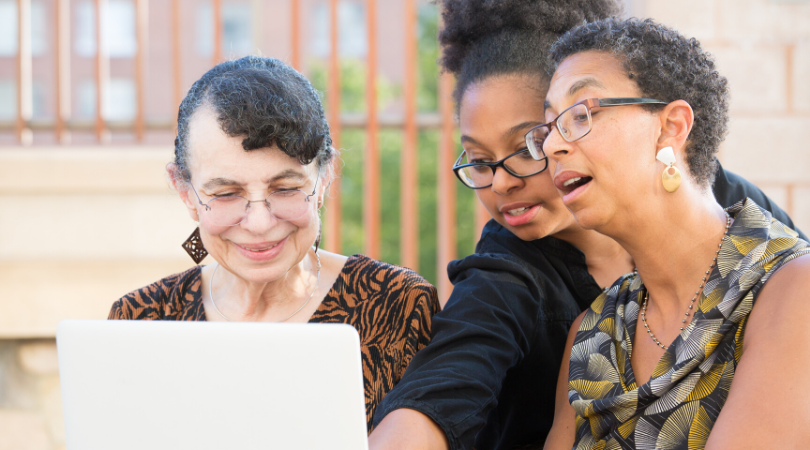How to Tell the Story of Your Life

Many people wish they could write a memoir or record a loved one’s stories, but getting started can be intimidating. Writer Jessica Burch demystifies the experience, helping families using a process she calls “life writing.”
What is "life writing?"
Life Writing is a process of documenting the stories of our life for others. It's as good a term as I can come up with to talk about what I do. One of the big challenges for me in doing this work is that it's not really an established field. Memoir of course is it's enormously popular and a multi-million dollar industry right now, but that word does not really encompass what it is I do.
Memoir implies a certain degree of professionalism and refinement. I have heard countless people tell me they want to write a memoir, and I ask "well are you a writer? Have you written much? Do you enjoy writing?" and the answers to these questions are often no, or unclear at best, and what I've come to realize is what people really want is to share their life stories, in their own words and reflections, and feel heard and seen in doing so.
There are countless ways beyond memoir writing to do that. The work can be done in many mediums, can take on a number of different life forms and be more raw, authentic, free, and simple than people often conceive of when first approaching the overwhelming amount of material that outlines an entire life.
One of my favorite and simplest ways to do this work, is through interview. The art of interview, when done well, can illuminate our truest selves in ways that even written work cannot. I have interviewed much of my own family, including my grandfather in 2017 while on his deathbed. These hours of recorded conversation, laughter and tears are unspeakably precious to me and my family. I very often recommend beginning with interview.


How is life writing beneficial for the writer and their family?
Life writing can be a profoundly effective medium through which to reflect meaningfully on one's life – the stages, shifts, memories, choices... This reflection creates a sense of self-understanding, purpose and clarity. In times of transition and uncertainty it can illuminate a path forward, and at the end of life it can provide an invaluable sense of peace and acceptance.
The stories themselves have the power to connect and heal. For families, the work creates a sense of lineage and heredity that can easily be lost as older generations die off, taking their stories with them. The old adage of “to understand where we’re going, we have to understand where we’ve been” rings very true here. Too often families talk about doing this work but never actually take the initiative, or don't know where to begin, and time passes until one day it's too late. Unfortunately, this often leaves younger generations searching for information that no longer exists.

How can someone get started writing about loved one?
Like I mentioned, I often suggest that people start by coordinating an interview. This is a simple, but really poignant starting point, and you can easily do it yourself.
Begin by scheduling a time, finding a quiet uninterrupted place, maybe brew some coffee or tea, and try foster a sense of non-judgment. Let your loved one know that you are simply curious, that there are no right and wrong answers, and they have complete reign over what is is they feel comfortable sharing.
Today any iPhone has programs capable of recording a conversation in a quiet room with sufficient quality. Be sure to look over the program you'll be using before you start, do a test recording, and be sure your phone is charged.
Come with a handful of questions and begin with those that are more lighthearted and fun. Try to find a topic that your interviewee is interested in, or a story they love to tell, this will help them find some comfort in being recorded so you might move into questions with more challenging answers and subject matter, like those about hardship and loss.
The key to interview is to shift away from conversation and into true listening. This is not about you, but your loved one. Ask thoughtful questions, and engage when need be to keep the stories coming, but for the most part maintain listening until thoughts run through completely on each question you ask. And be sure to truly listen.

What are good questions to jump start life writing?
I find that questions about childhood are a good place to begin. Jim Birren, often considered the father of modern gerontology, and an adamant proponent of life writing and guided autobiography, recommends asking questions that will allow memories to flow and connect outside of a chronological order. One of my favorite questions to begin with is actually the starting question in a series of interviews that compose a podcast I quite love right now, it's called On Being and the question is, basically, "tell me about the spiritual and religious background of your childhood". This question prompts individuals to explore several important things in the realm of memory - early influences, childhood memories, the earliest conceptions of self, imposed beliefs vs. self-knowing, how early experiences moved into the whole of our lives, greatly shaping our life's trajectory and ultimately our present.

Some people find the idea of writing intimidating, what advice would you give them?
There are a few things I reiterate to my students and clients consistently.
- You have the ruby slippers. This is your work; you have the ability to do it all by yourself.
- Ignore the voice of the inner critic when you're getting started. Nothing has to be perfect. In fact, very imperfect stories will remain intensely precious and meaningful to your family, and to those that share the details of your life experience.
- Try speaking some of the stories you want to tell onto a recording, then play them back and transcribe them into writing. You can edit afterwards.
- Instead of working chronologically, try using prompts that focus your thoughts into categories. Some prompts to consider are: where you come from/ family background, early childhood memories, times of transition and turning points, your health and the body, and your feelings about death and dying.
- Talk to people about what you're doing and why. These conversations will help you understand your work and your goals.
- Most importantly, enjoy the process.
Families can learn more about life writing by visiting Jessica Burch’s website.




